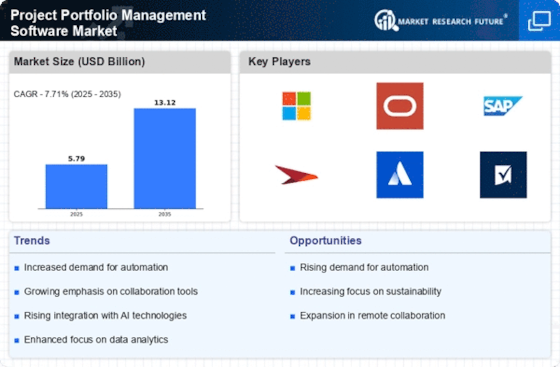Market Share
Project Portfolio Management Software Market Share Analysis
The dynamic nature of project management in numerous sectors has led to major trends and transformations in the Project Portfolio Management (PPM) Software industry.
PPM software with AI and ML capabilities is another trend. These tools allow firms to examine massive project data, find trends, and make data-driven forecasts, enhancing project results. PPM software helps manage risk, optimize resources, and forecast projects using AI and ML. This trend shows the industry's acknowledgment of new technology' revolutionary potential in project management.
Organizations want seamless connection with other corporate systems, therefore PPM software interoperability is vital. Integration with CRM, ERP, and other corporate applications is becoming more common in PPM software. Interoperability breaks down silos and unifies project management by providing a comprehensive perspective of organizational activities.
PPM software is changing to prioritize user experience and accessibility. When choosing PPM solutions, firms prioritize user-friendly interfaces, informative dashboards, and mobile accessibility. As more stakeholders—from team members to executives—get involved in project management, effective and easy-to-use software is needed. This tendency reflects a wider industry movement toward project team cooperation and communication.
PPM software companies stress strong security features due to the growing necessity of data protection in the digital era. With sensitive project data stored and handled in these systems, confidentiality and integrity are essential. Modern PPM software addresses data breaches and cyber dangers with encryption, access restrictions, and data protection rules.
Project management has embraced agile methods, impacting PPM software development. Companies are implementing Agile principles to better project responsiveness, adaptability, and cooperation. PPM software companies are supporting Agile principles including iterative development, constant feedback, and adaptive planning. This trend indicates a shift toward flexible and responsive project management.
SaaS and subscription-based pricing structures are common in PPM software. This move away from upfront licensing arrangements lets companies grow their usage as needed, decreasing cost and access barriers for smaller businesses. Organizations get the latest upgrades and features with the subscription model, enabling continual progress and innovation.
As firms realize the strategic importance of project portfolio management, PPM software demand is rising across industries. IT, healthcare, construction, and finance are using PPM solutions to improve project visibility, resource allocation, and risk mitigation. This broad adoption shows that efficient project management is essential to organizational success in today's competitive environment."



















Leave a Comment